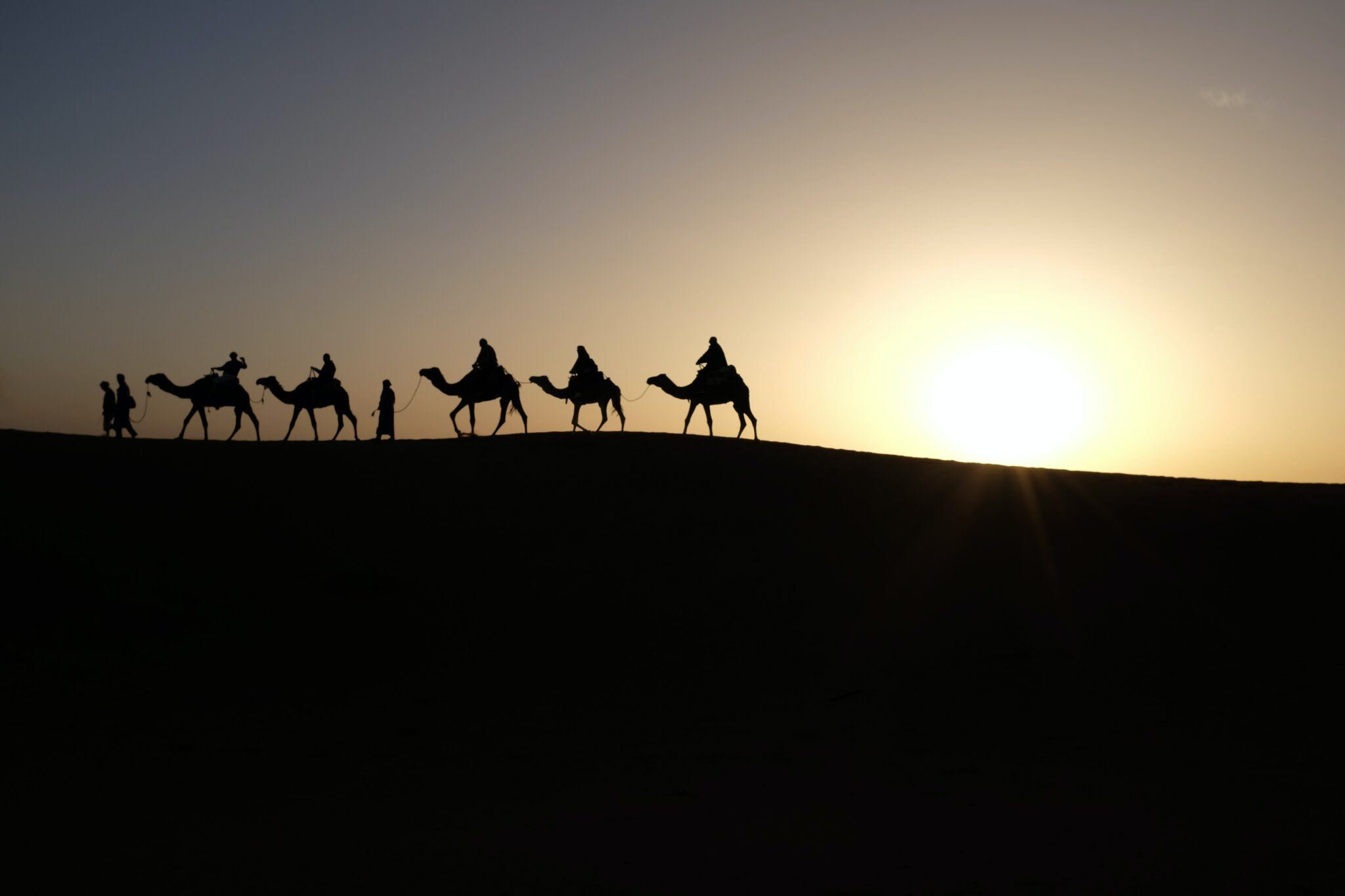F ound only in the Gospel of Matthew, the story of the magi, whom scholars believe were astrologers from ancient Persia, is one associated with the church holiday called Epiphany. These magi traveled a very long way, charting their course by the stars, feeling certain that under a special star they would find the promised King. In many Spanish-speaking countries, this “Dia de los Reyes Magos” is as important as Christmas! As little girls growing up in Spain, my sister and I wrote our wish list letter to these wise ones, not Santa. And we put out our shoes filled with carrots and greens for the camels to eat instead of milk and cookies! January 6 is indeed a wonderful day of family and community festivities, with parades, worship services, and celebratory foods, including the delicious rosca de reyes cake!
Related: Epiphany Celebration Ideas for Families and Churches
Epiphany also marks the end of the Christmas season and the beginning of the next liturgical one, falling 12 days after the traditional date we celebrate Jesus’s birth. Christians around the world celebrate it as a time of special wonder, an opportunity for a collective “aha moment” following the birth of the Messiah, God’s love made manifest in human form.
When I think about Epiphany and the story of the magi, hospitality comes to mind—and not modern-day concepts of hotel-style hospitality, but the deeper, biblical kind of hospitality. This is hospitality that draws the circle wide, and is expansive, like God’s love for us is. Hospitality that welcomes and cares for the stranger, where there is mutuality between guest and host, and where accessible space is created that nurtures belonging and participation for everyone.
Related: Equity-based hospitality study
So, what hospitality practices does this wonderful story of the magi visiting Jesus invite us to think about? Let’s look at three of them.
A joyful arrival and holistic hospitality
“When they saw that the star had stopped, they were overwhelmed with joy. On entering the house, they saw the child with Mary his mother; and they knelt down and paid him homage.” –Matthew 2:10-11a
When the magi learned they had reached their destination, they were overjoyed. And when they realized where they were, they knelt in reverence and gratitude. Those wise ones had been traveling for almost two years, scholars agree, and they had already taken a wrong turn at Herod’s palace.
There is a sweet reward in arriving, isn’t there? Just by getting there, one can start to sense the hospitality of the host. Think about pulling up to a loved one’s home after many hours in transit. There is a joy and comfort in knowing that welcome and provision await.
I think about my friends Pastors Israel and Karla sharing the experience of how people who had recently arrived to this country felt upon entering their church. They arrived via homeland security buses, were welcomed by a team of church members, and were able to shower, eat, and change into fresh clothing. Pastor Israel then asked, “Who here believes in God?” Nearly every hand quickly went up. He continued, “Well, God was with you when you were walking through the desert, and waiting in the ICE facility, and God is most definitely here with you now. Let’s take a moment to thank God for bringing you this far safely.” Praise and worship began, and the exhausted, relieved group prayed, sang, wept, and gave thanks. Hands were raised, eyes shut, and many dropped to their knees. They were experiencing holistic hospitality for their minds, bodies, and souls.
That’s the kind of welcome I imagine the magi experienced as they arrived at Jesus’s house, bringing them much joy and gratitude as they knelt before the Messiah.
Choice gifts to honor their host
“Then, opening their treasure chests, they offered him gifts of gold, frankincense, and myrrh.” –Matthew 2:11b
Think about the magi preparing for travel. They would have spent time charting their course, for their GPS was the night sky and required careful navigation. They needed to assemble a team to journey with them: those who would lead the camels, pitch the tents, cook the meals. And they also needed to prepare the gifts to present to the Messiah. They most likely knew these were typical gifts for a king in those ancient times, and therefore had gone to great lengths to be sure they had the best of the best of each. I imagine they were sure to wrap them in the most beautiful gift boxes they could find.
Today, I think of my daughter, a college student who is headed to Cuenca, Ecuador, for a month-long course. She will be living with a host family and it is customary to bring gifts for them. It has been fun to learn a bit about the members of the household and to brainstorm what to bring to each of them, choosing each item with thought and care. Like the magi of long ago, she and her fellow students will come bearing specially chosen gifts to honor their host families.
There is something powerful about this mutuality of guest and host as each offers gifts to the other. Hospitality is demonstrated as a full-circle activity, everyone has a part to play in extending it to each other. This is a great lesson for those of us in North America, where we tend to think of hospitality as a one-way endeavor. Embracing the both/and nature of hospitality helps to draw the circle wide and make room to honor and appreciate each other. Each party contributes, and this helps to create a sense of purpose and belonging.
Whether we welcome others or arrive as guests, let’s honor each other in God-honoring ways—perhaps with choice gifts of time, care, specially selected items, or hospitable environments.
Safe hospitality: protecting the vulnerable
“And having been warned in a dream not to return to Herod, they left for their own country by another road.” –Matthew 2:12
Speaking of purpose, I mentioned earlier that the magi took a wrong turn originally, thinking the star had stopped over Herod’s palace. It made sense, of course: where better to look for a king? But those wise ones were listening to wisdom greater than their own. When they reached Jesus, and realized they had indeed found the Messiah, they were transformed. They knelt, they worshiped, they gave their gifts and, in return, they were changed. They came to understand the divine truth of this little one living quietly with his parents—that this king was not like the others. Here, the mutuality of hospitality takes the form of protection. Instead of reporting back to Herod, they went home “by another road.”
When have you been called to protect those who are vulnerable, to create a safe, hospitable environment for them? Recently, I visited Friends to Friends Community Church in northern New Jersey. Pastor Joanne and her leadership team work diligently to create a space where adults with developmental and physical disabilities can feel at home and worship freely. The worship service is Holy Spirit-filled and interactive. Congregants are invited to participate in whatever way makes them connect with God—singing, reading Scripture, coming up to the front during hymns to praise, dance, and shake percussion instruments. Some prefer to sit quietly in their pew. Everyone is welcome to worship as they feel so led. Pastor Joanne has had to go above and beyond to make sure this sanctuary is a safe, secure space, yet also open and accessible. This has also involved getting a grant to help the church get automatic doors to replace the heavy old ones that created such a barrier for those trying to get in. Seeing this inspiring, joyful ministry in action, I understand more clearly why it needs to be protected and advocated for. My colleagues and I were transformed by our visit, and indeed left by a proverbial different route, having seen and better understood something very special, unique, and inclusive. We embraced fully the beauty and importance of Pastor Joanne and her team’s commitment to their congregation.
Like the magi protected the baby Jesus, may we extend hospitality and protect the vulnerable people in our own lives.
Reflect
Turn now to your own life and ministry. How can the magi’s journey inform your own hospitality practices?
Where might you have the opportunity to offer or receive comforting, lavish welcome? To bring thoughtful gifts to engage in mutual hospitality when you visit someone? How are you called to create and champion accessible spaces where everyone belongs and can participate?
Epiphany season is the perfect time to check out our free equity-based hospitality study and increase your hospitality competencies! If you would like to share what you learn, or have a story of hospitality (as guest or host), Rev. Liz would love to hear from you at ltesta@rca.org.

Rev. Liz Testa
Rev. Liz Testa is director of women’s transformation and leadership for the Reformed Church in America. She hosted four seasons of the Lavish Hope podcast. She is passionate about creating a sense of belonging and nurturing the gifts and leadership of others. You can connect with Liz by email at etesta@rca.org.



